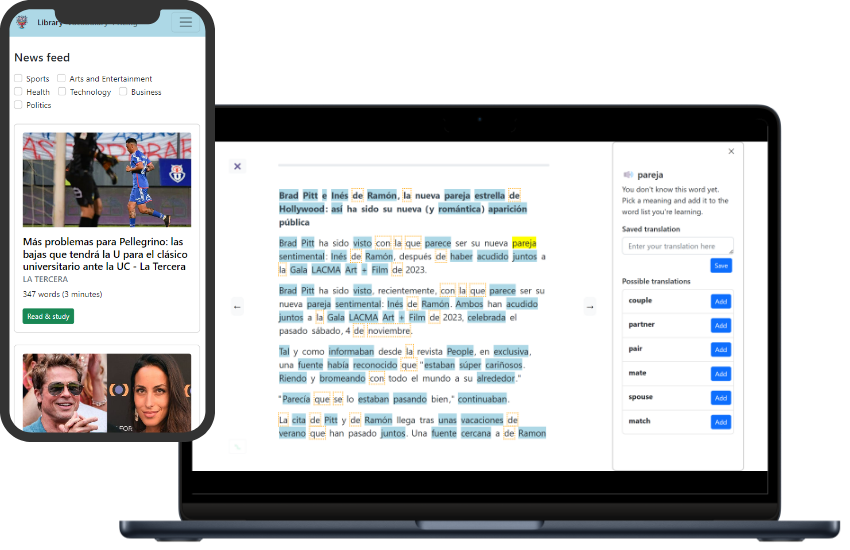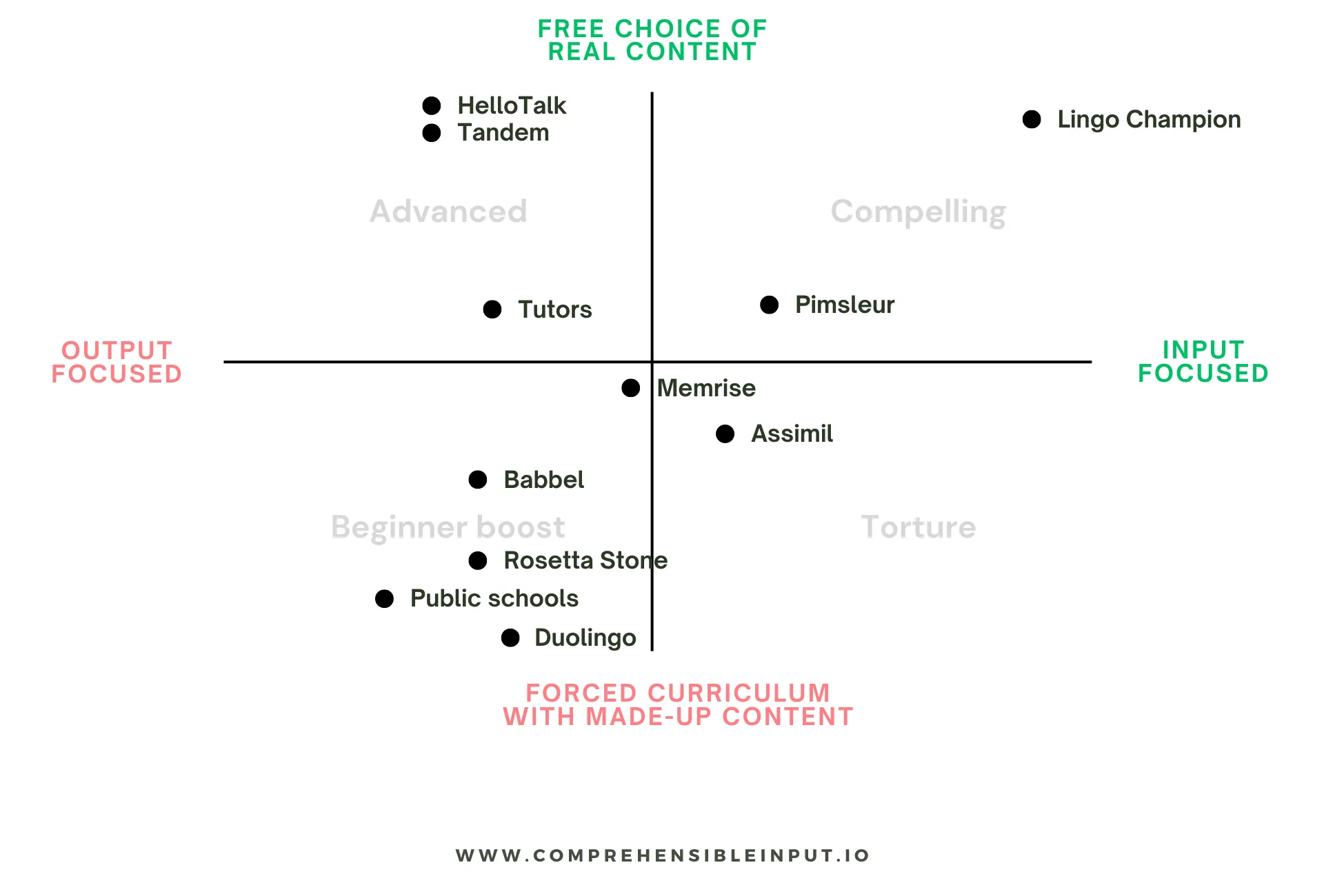Duolingo for Advanced Learners – Better Alternatives Compared
Duolingo is a popular entry point for beginners. But for advanced learners, its gamified drills and made-up sentences quickly lose effectiveness. Mastery requires authentic input and real practice—things Duolingo was never designed to provide.
This page explores Duolingo’s limits at higher levels, and compares it with Babbel, Tutors, Language Courses, Tandem, and Lingo Champion—placing them in a clear framework for evaluating language learning methods.
Research & Critique
Duolingo often cites its own research, but independent analysis shows why these claims can be misleading:
- Biased scope — Studies emphasize reading/listening, but omit speaking and writing, giving an incomplete picture of proficiency (source).
- Anecdotal failures — One learner studied 300 hours of Swedish on Duolingo and still failed a university exam, proving app progress ≠ fluency (source).
- Expert consensus — Linguists agree Duolingo can help with receptive skills, but it falls short on productive fluency.
- Gamification trade-offs — Streaks and badges keep users engaged, but often distract from deep, meaningful learning.
Framework for Comparing Language Learning Methods
- Output focused – emphasis on speaking/writing tasks and explicit study.
- Input focused – emphasis on reading/listening to understandable content and subconscious acquisition.
- Forced curriculum – fixed sequence; limited learner choice; content often de-contextualized or made-up.
- Free choice of real content – learner chooses authentic material, similar to what native speakers consume.
Image adapted from ComprehensibleInput.io
Where each option stands
- Duolingo — Output-leaning drills inside a forced, gamified path; helpful for basics, not built for advanced learning.
- Babbel — Course-first, with grammar and dialogues; structured, but still exercise-heavy and limited in real input.
- Tutors — Personalized and flexible, with authentic interaction; strongly output-focused, input depends on tutor choice.
- Language Courses — Structured and curriculum-first; heavy on grammar/tests, with limited authentic content.
- Tandem — Free-choice chats with natives; strongly output-focused, useful once you already have vocabulary.
- Lingo Champion — Input-focused, with real content (articles, videos, ebooks) plus word tracking, grammar guides, and AI helpers.
Feature Comparison
| Feature | Duolingo | Babbel | Tutors | Language Courses | Tandem | Lingo Champion |
|---|---|---|---|---|---|---|
| General approach | ||||||
| Approach | Gamified curriculum | Course-style lessons | One-on-one lessons | Course-style classes | Social chatting | Comprehensible input |
| Focus | Output & drills | Output & grammar | Output (speaking/writing) | Output & grammar | Output (messages/voice) | Input (read/listen) |
| Content source | Made-up lesson content | Made-up & dialogues | Varies by tutor | Textbooks, exercises | Real user exchanges | Real news, YouTube, ebooks |
| Curriculum flexibility | Fixed path | Fixed path | Flexible | Fixed | Free choice | Free choice |
| Features | ||||||
| Known-word tracking | ✅ † | ✅ † | ❌ | ❌ | ❌ | ✅ |
| Import web pages / videos | ❌ | ❌ | ❌ | ❌ | ❌ | ✅ |
| Text-to-speech (for imports) | ❌ | ❌ | ❌ | ❌ | ❌ | ✅ |
| Flashcards / SRS | ✅ † | ✅ † | ❌ | ❌ | ❌ | ✅ |
| Grammar guides | ✅ | ✅ | ✅ | ✅ | ❌ | ✅ |
| AI assistance | ✅ | ✅ | ❌ | ❌ | ❌ | ✅ |
| Speaking practice | ✅ | ✅ | ✅ | ✅ | ✅ | ❌ |
| Writing practice | ✅ | ✅ | ✅ | ✅ | ✅ | ✅ |
| Compete with friends | ✅ | ❌ | ❌ | ❌ | ❌ | ❌ |
| Make friends | ❌ | ❌ | ❌ | ❌ | ✅ | ❌ |
| Learn while browsing (extension) | ❌ | ❌ | ❌ | ❌ | ❌ | ✅ |
| Vocabulary export | ❌ †† | ❌ | ❌ | ❌ | ❌ | ✅ |
| Platforms | ||||||
| Web | ✅ | ✅ | ❌ ††† | ❌ ††† | ✅ | ✅ |
| Android | ✅ | ✅ | ❌ ††† | ❌ ††† | ✅ | ✅ |
| iOS | ✅ | ✅ | ❌ ††† | ❌ ††† | ✅ | ✅ |
| Pricing | ||||||
| Free plan | ✅ | ✅ | ❌ | ❌ | ✅ | ✅ |
| Premium starting price (per month) | $12.99 | $13.45 | $10–40/hr | $200–1000+/term | $16.40 | $5.99 |
- † Not customizable
- †† Only possible for some languages using the Lingo Champion browser extension
- ††† Tutors and classes may be offered through larger online platforms, but availability is inconsistent
Choosing the right path for advanced learners
- Duolingo – Good for beginners or habit-building, but not enough for advanced learning.
- Babbel – A stronger course-based option, but still limited in authentic input.
- Tutors – Best for active speaking practice and custom guidance.
- Language Courses – Useful for accountability and structure, but often slow and artificial.
- Tandem – Great for real-world interaction, once you have vocabulary to sustain it.
- Lingo Champion – Best for expanding advanced vocabulary through authentic reading and listening.

